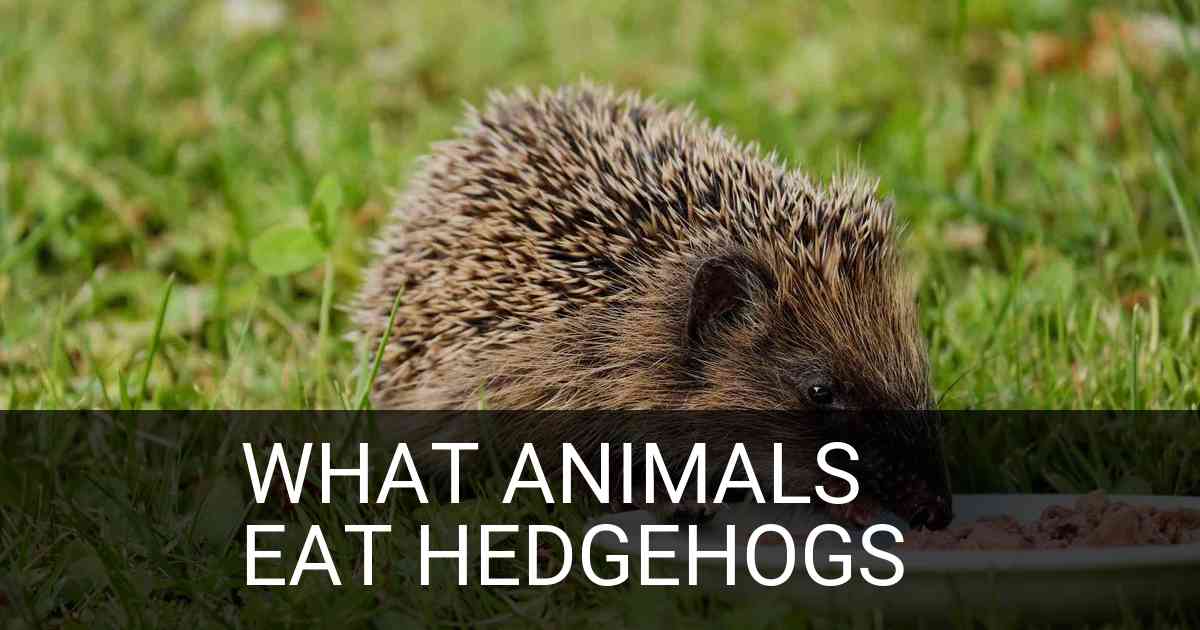
If you’ve ever wondered what animals eat hedgehogs, then you’re in the right place. Hedgehogs are small mammals that live a fairly solitary life and mainly feed on insects, worms and other invertebrates. However, they can be found as prey for a variety of larger predators including foxes, badgers, weasels and birds of prey. In this article, we’ll take a look at some of the most common animals that eat hedgehogs as well as how to protect these little critters from becoming food for predators. So let’s dive in and find out what animals eat hedgehogs!
What Animals Eat Hedgehogs?
Hedgehogs are small, solitary mammals that mainly feed on insects, worms and other invertebrates. Unfortunately for them, they can also be prey for a wide variety of larger predators.
Foxes
Foxes are one of the most common predators that eat hedgehogs. They typically hunt in pairs or packs and have powerful jaws and claws which allow them to easily catch and kill their prey. Additionally, foxes have excellent night vision which gives them an advantage when hunting hedgehogs at dusk or during the night.
Badgers
Badgers are another common predator of hedgehog populations. Like foxes, badgers hunt in groups and have strong jaws that help them to subdue their prey quickly. Badger setts (burrows) often contain large numbers of hedgehog carcasses as evidence of their predation.
Weasels
Weasels are smaller animals than foxes or badgers but they can still pose a threat to hedgehog populations. Weasels are very agile hunters with sharp teeth and claws that make it easy for them to catch their prey. They tend to hunt alone so they may not take out large numbers of hedgehog colonies like some other predators do.
Birds of Prey
Birds such as hawks, eagles, owls and kites all enjoy feasting on small mammals such as hedgehogs. These birds swoop down from above with incredible speed and accuracy to capture their target before flying away again with ease. The size disparity between a bird’s talons and a hedgehog’s spines makes this type of predation particularly efficient since there is little chance for the latter to escape unharmed.
Do Foxes Prey on Hedgehogs?
Foxes are omnivorous predators, meaning they will eat a variety of different foods including small mammals, birds, insects and plants. Hedgehogs are one such small mammal that foxes may prey upon.
The presence of hedgehogs in an area can attract foxes as the hedgehog’s insect-rich diet makes them an ideal food source for foxes. Foxes have been known to hunt solo or in packs and their size and agility means they can take down larger prey such as hedgehogs with ease.
However, despite the fact that foxes are capable hunters of hedgehogs it is still relatively uncommon for them to do so due to competition from other predators. Hedgehogs also tend to be nocturnal creatures which reduces the chances of being hunted by a diurnal (daytime) predator like a fox.
In areas where there is an abundance of both species then it is likely that some predation will occur but this would not be considered normal behaviour under most circumstances.
How Can We Protect Hedgehogs From Fox Predation?
- Provide Shelter: Hedgehog homes should be provided to give the animals a safe place to hide during the day when they are more vulnerable.
- Build Fences: Fencing around gardens or areas where hedgehog populations exist can help keep out potential predators such as foxes.
The Decline of the Hedgehog: Investigating the Causes of Population Loss
Hedgehogs are on the decline in many parts of the world due to a variety of factors. From habitat destruction and fragmentation, to climate change, to predation by other animals and humans, hedgehog populations have been decreasing for decades.
Habitat Destruction & Fragmentation
One of the primary causes for hedgehog population decline is habitat destruction & fragmentation. This includes deforestation, urbanization, and farming practices that reduce or eliminate suitable habitats for hedgehogs. In addition, roads and highways can fragment natural areas into smaller pieces too small to support a healthy population of hedgehogs.
Climate Change
Another factor contributing to hedgehog population decline is climate change. As temperatures rise around the world, it has become increasingly difficult for some species—including hedgehogs—to adapt and survive in their current habitats. Furthermore, changing weather patterns have disrupted traditional food sources available to these animals.
Predation by Other Animals & Humans
Finally, predation by other animals—such as foxes and cats—as well as humans hunting them for their meat or fur has resulted in a decrease in hedgehog populations across much of Europe and Asia.
Signs of Illness and Injury in Pet Hedgehogs That Can Be Fatal
Hedgehogs, like any other pet, can become ill or suffer an injury. It is important to be aware of the signs that these issues may present so that you can provide your hedgehog with prompt medical attention if needed.
Common Signs of Illness
- Lethargy: If your hedgehog is not as active as usual and seems to sleep more than normal, this could be a sign of illness.
- Changes in Appetite: A sudden decrease in appetite or refusal to eat altogether are both signs that something may be wrong.
- Wheezing/Labored Breathing:If you hear wheezing or notice that your hedgehog’s breath is labored, this could indicate a respiratory infection.
- Diarrhea/Constipation:Diarrhea or constipation can also be a sign of illness or an internal parasite problem.
Common Signs of Injury
- Swelling/Bruising:Swelling and bruising on the body could indicate trauma from an accident or fight with another animal.
- Bleeding:Bleeding from anywhere on the body should always be taken seriously and looked at by a veterinarian right away.
- Limping:Limping, especially when accompanied by swelling, could mean there has been an injury to one of the legs.
- Unusual Posture:An unnatural posture such as sitting hunched over or holding one side up higher than the other can indicate pain caused by an internal issue.
Conclusion
Overall, hedgehogs are omnivores that feed on a wide variety of food sources. They primarily eat insects and worms, but they may also consume some fruits, vegetables, and even small vertebrates such as mice and frogs. Hedgehogs can be an interesting addition to your garden or backyard ecosystem by helping to control insect populations. However, it is important to provide them with a balanced diet in order to ensure their health and well-being. By understanding what animals eat hedgehogs, you can provide them with the nutrition they need to thrive in their environment.

